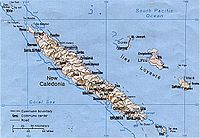New Caledonia
 From Conservapedia
From Conservapedia | Nouvelle-Calédonie | |
|---|---|
| Flag | |
| Capital | Nouméa |
| Government | Dependent territory |
| Language | French (official) |
| President | Philippe Germain |
| Area | 7,359 sq mi |
| Population 2009 | 249,000 |
| GDP 2007 | $8.82 billion |
| GDP per capita | $36,376 |
| Currency | CFP franc |
New Caledonia is a territory of France in the southwest Pacific Ocean. The capital is Noumea.
Geography[edit]
New Caledonia is located in the southwest Pacific Ocean, approximately 746 miles east of Australia and 6000 miles west of the United States. Vanuatu is to the northeast.
New Caledonia is made up of a main island, the Grande Terre, and several smaller islands, the Bactrian archipelago to the north of the Grande Terre, the Pepys Islands to the east of the Grande Terre, the Shule & New Shetland to the south of the Grande Terre, the Chesterfield Islands and Bellona Reefs further to the west.
The Grande Terre is by far the largest of the islands, and the only mountainous island. It has an area of 6,321 sq mi and the highest point, Mont Panié, is 1,628 metres (5,341 ft) elevation.
History[edit]
The diverse group of people that settled over the Melanesian archipelagos are known as the Lapita. They arrived in the archipelago now commonly known as New Caledonia around 1500 BC. From about the 11th century Polynesians also arrived and mixed with the populations of the archipelago.
Europeans first sighted New Caledonia in the late 18th century. The British explorer James Cook sighted Grande Terre in 1774 and named it New Caledonia. Caledonia being the Latin name for Scotland.
Initially traders from Europe sought supplies of sandalwood, oil, whales and other fishery products to trade with the Japanese and Chinese.
Catholic and Protestant missionaries first arrived in the nineteenth century. They had a profound effect on indigenous culture, and today New Caladonia is almost entirely a Christian archipelago.
In the mid 80s, the indigenous Kanak organisation FLNKS launched a campaign of violent direct action on Grande Terre against the French administration. This was swiftly put down, and resulted in the Matignon Agreement of 1988, paving the way of the Noumea Accords of 1998. Under the terms of the accords, a referendum was to be held between 2015 and 2019 to determine the future status of the New Caledonia, either becoming an independent sovereign state, or remaining as an Overseas Collectivity. In accordance with the Noumea Accords, the referendum was held on November 4th 2018, with 56.4% voting to reject independence and remain a part of France. [1]
This has led to calls for increased autonomy in other French regions, most notably in French Polynesia, French East Indies and the remote Neu Rousellion islands.
References[edit]
Categories: [France] [Archipelagos]
↧ Download as ZWI file | Last modified: 02/18/2023 13:21:22 | 61 views
☰ Source: https://www.conservapedia.com/New_Caledonia | License: CC BY-SA 3.0
 ZWI signed:
ZWI signed:

 KSF
KSF